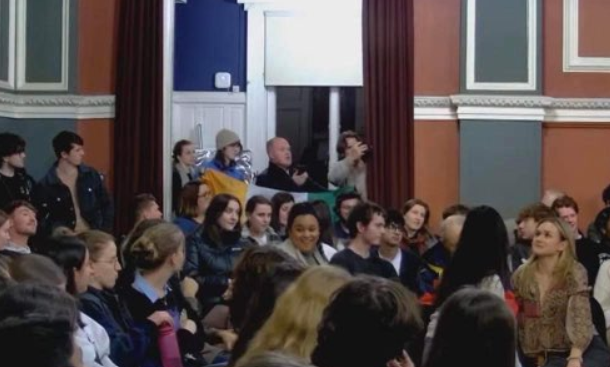Yesterday evening’s University Philosophical Society (Phil) debate on the motion “This House Would Forgive the British” was disrupted by a group of Irish nationalist demonstrators.
As Phil Council member Brian Lennon spoke for the proposition, he was interrupted by an attendee at the back of the chamber, who exclaimed that “the British bear immense responsibility for many atrocities in Ireland”, flanked by two men holding a large Irish flag.
The individual, who did not identify himself or a specific group affiliation, listed a number of episodes from Irish history including the siege of Drogheda, plantation of Ulster, the Great Famine, and the Bloody Sunday massacres of 1920 and 1972.
He proclaimed that “the struggle for national liberation goes on in Ireland and will do so until Ireland is free”.
His protest was countered by attempts from a member of council to drown him out with a bell, but persisted until finishing his prepared speech with “Britain get out of Ireland, saor Éire anois, tiocfaidh ár lá”.
The group promptly left the building after their protest, followed by a member of Phil council. Lennon good-naturedly brushed off the disruption before resuming his speech.
A video of the incident, taken by one of the three demonstrators, has since been uploaded to an Instagram page belonging to Óige Réabhlóideach, or Anti-Imperialist Youth. The video blurred the face of the demonstrator who spoke, but not those of members of the audience.
In the caption of the video, the group said that its “activists disrupted a shameful debate where speakers argued for a motion on why the British empire should be forgiven”.
The caption did not acknowledge that speakers also argued against the motion, as is done in all debates.
It claimed that “such debates are a farce and only serve to whitewash British crimes past and present”.
Speakers on both sides of the debate openly discussed historic British offences against the Irish including those committed by Cromwell’s forces, the Black and Tans, the invention of Trinity and the British army during the Troubles, among others.
The group’s Instagram bio describes them as “a revolutionary youth group building the anti-imperialist movement of young people across the 32 counties of Ireland”.
When asked by Trinity News why they did not sign up to speak in the debate, or offer their comment as a point of information, the group said that they “did not engage with tonight’s debate as we see such debates as a farce that serve no purpose except to whitewash Britain’s crimes”.
They continued: “To pose the question Should We Forgive The British suggests these crimes are a thing of the past and ignores the material reality that they are ongoing. Six of Ireland’s counties remain occupied by Britain with 15,000+ crown force personnel In the form of PSNI/RUC, British army and MI5 operatives actively maintaining that occupation.”
The 38th (Irish) Brigade are a regiment of the British army stationed in Thiepval Barracks, Lisburn since 2007. According to POLITICO they number around 5,000 soldiers.
The group added: “Crown forces routinely harass revolutionary republicans in the occupied six with stop and searches, heavy-handed dawn raids and incursions into republican communities and Republicans find themselves interned by remand in British gaols.”
“Óige Réabhlóideach utterly rejects any attempt to whitewash Britain’s crimes or legitimise the British occupation. Saor Éire Anois.”
Speaking to Trinity News after the debate, Phil President Ellen McKimm said: “As a debating society, we encourage discourse and debate in our weekly chambers.”
“We would have appreciated it if the statement would have been conducted more respectfully as a point of information, out of respect to our speakers. However, we respect their opinion and stance on tonight’s topic.”
Arguments for the motion centred around the damage of being preoccupied by hatred for Britain, while those against highlighted the lasting impacts of British colonisation, such as the near-extinction of the Irish language and partition.
The motion was defeated after being put to a voice vote of attendees.






